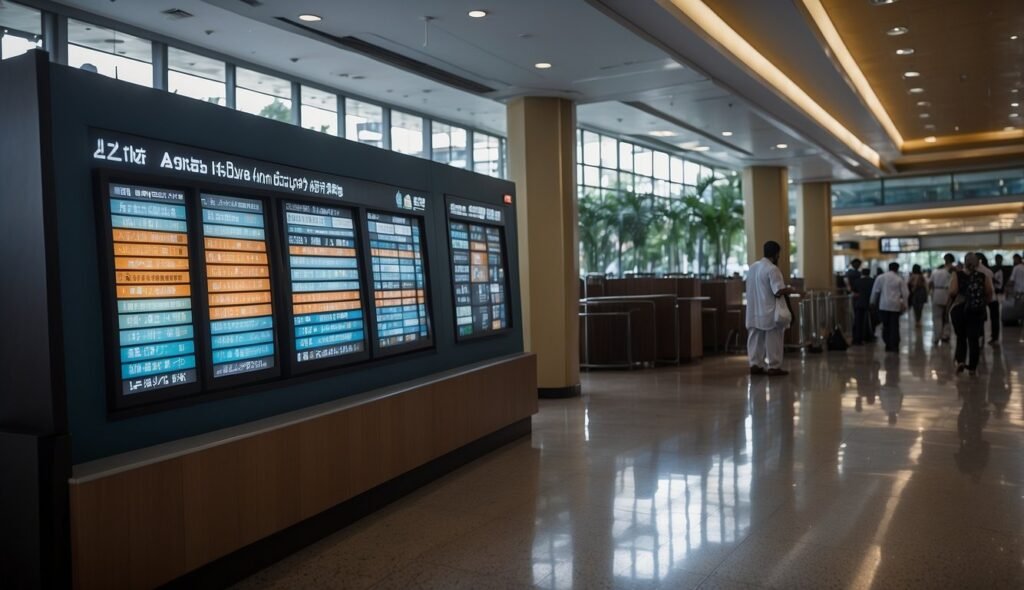Friday prayer, a cornerstone of Islamic practice, holds immense spiritual and social significance. However, the ever-evolving landscape of urban living and growing Muslim populations have presented challenges for mosques in accommodating worshippers during this crucial congregational prayer. In response, some mosques have implemented Friday prayer booking systems, prompting both excitement and questions within the Muslim community. This comprehensive exploration delves into the world of Friday prayer booking, analyzing its merits, potential drawbacks, and considerations for successful implementation.
The Essence of Friday Prayer: A Spiritual and Communal Pillar
Friday prayer, known as Jumu’ah in Arabic, transcends a mere ritualistic act. Surah Al-Jumu’ah in the Quran emphasizes its importance, urging believers to prioritize attending over worldly pursuits (Quran 62:9). This congregational prayer fosters a multitude of benefits that enrich the lives of Muslims:
- Renewal of Faith: Friday sermons (Khutbah) serve as a potent source of spiritual nourishment. Delivered by knowledgeable imams, these sermons address contemporary issues, remind worshippers of core Islamic beliefs, and inspire them to lead righteous lives.
- Strengthening the Ummah: Jumu’ah fosters a profound sense of community (Ummah) by bringing together Muslims from various walks of life. Standing shoulder-to-shoulder in prayer underscores the unity and solidarity within the Islamic faith.
- Display of Muslim Identity: A vibrant and sizeable congregation signifies the presence and strength of the Muslim community. This visible display can combat negative stereotypes and promote understanding within broader society.

Historically, attending Friday prayers was based on a first-come, first-served approach. However, with rapid urbanization and growing Muslim populations, mosques often reach capacity, leaving many unable to participate in this important ritual. This is where Friday prayer booking systems emerge as a potential solution.
The Rise of Friday Prayer Booking Systems: Necessity or Innovation?
The concept of booking a spot for Friday prayer might seem like a recent innovation. However, it’s a response to a tangible need arising from changing demographics and limited mosque space. Here’s how these booking systems function:
- Online Platforms: Many mosques leverage user-friendly online platforms that allow worshippers to register for specific prayer sessions. This registration typically involves providing basic information and selecting the desired prayer time.
- Mobile Applications: Technology-savvy mosques have gone a step further by creating mobile apps for booking purposes. These apps offer a convenient way to register for Jumu’ah on the go, eliminating the need for visiting the mosque in person.
These booking systems offer a range of advantages for both mosques and worshippers:
- Guaranteed Participation: Booking systems provide peace of mind for worshippers, ensuring them a designated spot in the prayer hall. This eliminates the anxiety of arriving early and potentially being turned away due to space limitations.
- Improved Planning and Resource Allocation: By having an estimate of expected attendance, mosques can plan more efficiently. This translates to better allocation of space and manpower for managing crowds and ensuring a smooth experience for all.
- Reduced Congestion: Bookings help to streamline the entry process, minimizing overcrowding and long lines before prayers. This can be particularly beneficial for elderly or disabled individuals who might face difficulty navigating crowded spaces.
- Valuable Data Collection: Booking systems generate valuable data on attendance patterns. This data can be used by mosques to tailor their services and resources to better meet the needs of their communities. Analyzing these trends can help mosques determine if they need to expand prayer halls or offer additional prayer sessions during peak times.
However, like any innovation, Friday prayer booking systems come with potential drawbacks that require careful consideration.
Addressing Potential Drawbacks: A Balanced Approach to Friday Prayer Bookings
While booking systems offer undeniable benefits, it’s crucial to acknowledge and address potential limitations to ensure an inclusive and positive experience for the entire Muslim community:
- The Digital Divide: Not everyone has access to smartphones or reliable internet connections. This digital divide excludes some worshippers, particularly the elderly or those residing in underserved areas. Mosques need to find alternative solutions for such individuals, such as phone reservations or dedicated quotas for walk-in attendees.
- Last-Minute Changes: Unforeseen circumstances like sudden illness or childcare issues can prevent registered individuals from attending even though they booked a spot. This creates empty spaces despite bookings. To mitigate this issue, mosques can consider implementing a waiting list system where cancellations can be filled promptly.
- Inflexibility and Discouragement of Spontaneous Attendance: Bookings might discourage spontaneous attendance. For example, someone who might have considered attending prayers upon finishing errands nearby might hesitate if all slots are booked. This could potentially diminish the beauty of spontaneous participation and community spirit.
- Gaming the System: Some individuals might exploit the system by booking multiple slots to ensure a spot, leaving others without an opportunity to participate. To address this, mosques can implement limitations on the number of bookings allowed per person or family. Additionally, requiring confirmation emails or phone calls before finalizing bookings can help deter those attempting to reserve multiple spots.
Considerations for Implementing Friday Prayer Booking Systems
Mosque administrations considering adopting booking systems should meticulously evaluate the following factors to ensure a successful implementation:
- Community Needs: Conducting a thorough needs assessment within the community is paramount. This involves evaluating the size and demographics of the congregation, internet accessibility within the area, and the potential impact on different age groups and socioeconomic backgrounds.
- Technical Infrastructure: A robust booking platform is essential for a smooth experience. The chosen platform should be user-friendly, accessible on various devices, and equipped with robust data security measures to protect user information.
- Communication Strategy: A clear and comprehensive communication strategy is crucial to ensure everyone understands the booking process, guidelines, and potential limitations. This can be achieved through multiple channels, including mosque websites, social media platforms, flyers, and announcements during regular prayers.
- Alternative Arrangements: For those who face difficulties using the booking system, mosques should offer alternative arrangements. This might include phone reservations for those lacking internet access or designated quotas for walk-in attendees on a first-come, first-served basis.
- Flexibility: Building in flexibility within the booking system caters to unforeseen circumstances. Consider offering multiple booking slots throughout the day to accommodate different prayer preferences. Additionally, implementing a waiting list system allows mosques to fill empty spaces due to cancellations efficiently.
By thoughtfully addressing these considerations, mosques can leverage booking systems to their advantage, ensuring a more organized and inclusive Friday prayer experience for everyone.
The Future of Friday Prayer Booking
Friday prayer booking systems represent a practical solution for managing growing congregations in urban settings. As technology continues to evolve, we can expect advancements in these systems, offering greater functionality and convenience:
- Location-Based Prayer Timings: Booking systems can integrate with location services, automatically displaying accurate prayer timings based on the user’s location. This eliminates the need for manual calculations and ensures worshippers register for the correct prayer session.
- Real-Time Capacity Updates: Implementing real-time capacity updates within the booking system allows users to see the remaining available spots for each prayer session. This transparency helps worshippers make informed decisions about booking and reduces the anxiety of arriving at a full mosque.
- Integrated Functionality: Future systems could offer additional functionalities beyond booking. Imagine integrating online donation options or volunteer registration alongside prayer bookings. This streamlines the process for worshippers who wish to contribute to the mosque’s operations.
However, it’s crucial to remember that technology should serve as a tool, not a replacement for the core values associated with Friday prayer. Mosques must ensure that booking systems do not create an impersonal experience or hinder the spontaneous spirit of attending prayers.
Beyond Booking: Enhancing the Friday Prayer Experience
While booking systems address the issue of space limitations, mosques can further elevate the Friday prayer experience by focusing on the following aspects:
- Engaging Khutbahs: Delivering well-researched and relevant sermons that resonate with the congregation’s diverse needs and interests is vital. Imams can incorporate multimedia elements, address current events from an Islamic perspective, and encourage interactive discussions after prayers.
- Educational Programs: Organizing workshops or lectures before or after Friday prayers can deepen the community’s understanding of Islam. These sessions can cover a wide range of topics, from Islamic jurisprudence to contemporary Islamic thought.
- Welcoming Environment: Creating a warm and welcoming atmosphere for all attendees, regardless of background or booking status, is essential. This can be achieved through friendly greetings, offering assistance to newcomers, and ensuring the mosque is clean and well-maintained.
- Volunteer Opportunities: Encouraging volunteers to assist with crowd management, registration, or other tasks during Friday prayers fosters a sense of community and shared responsibility. This not only lightens the workload for mosque staff but also allows worshippers to contribute their time and skills.
By implementing these measures alongside a well-designed booking system, mosques can create a vibrant and enriching Friday prayer experience that caters to the spiritual and social needs of their communities.
Conclusion
Friday prayer booking systems represent a novel approach to managing space limitations in modern mosques. While these systems offer undeniable benefits like guaranteed participation, improved planning, and reduced congestion, it’s crucial to acknowledge and address potential drawbacks like digital exclusion and inflexibility.
The key lies in striking a balance. Mosques can leverage technology while remaining mindful of the core values associated with Friday prayer. By implementing booking systems thoughtfully, alongside initiatives that foster a welcoming and enriching environment, mosques can ensure that Friday prayers continue to be a cornerstone of spiritual growth and community connection for Muslims in the ever-evolving world.









